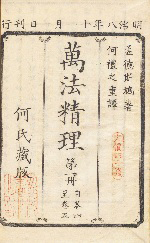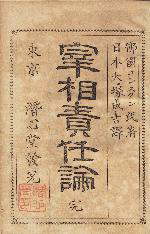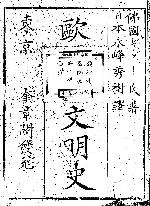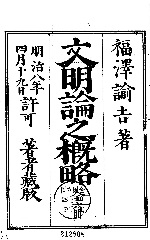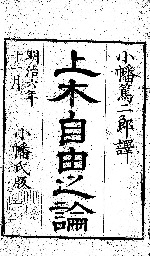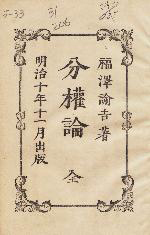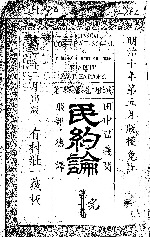![]()
Chapter 1: Politics and law
Section 1: The introduction of French political thought
At the beginning of the Meiji Era, there was a great deal of active translation of French political thought related texts. The translated authors were a diverse lineup which included Charles Louis de Secondat de la Brède et de Montesquieu (1689-1755), Voltaire (1694-1778), Jean-Jacques Rousseau (1712-1778), Joseph-Marie de Maistre (1753-1821), Benjamin Constant (1767-1830), François-Pierre-Guillaume Guizot (1787-1874), Charles Alexis Henri Clérel de Tocqueville (1805-1859), Pierre-Joseph Proudhon (1809-1865). We would like to examine some of these translations herein. Looking at the history of the translators shows that individuals originally involved in Chinese studies, switched to Dutch studies and then later turned their sights to Britain and France. We'd also like to focus on the appearance of original writings based on the assimilated ideologies.
Charles de Secondat, baron de Montesquieu, KA Reishi (Tr.), Banpō seiri, GA Noriyuki, 1875-1876 [852-58] 
Charles-Louis de Secondat de la Brède et de Montesquieu was an Enlightenment thinker who was active in the first half of the 18th century. After studying law at the University of Bordeaux, he worked in the Parlement of Bordeaux, and became famous after writing the epistolary novel Persian Letters. The original is the chief work of Montesquieu, known under the name The spirit of the laws, which is well known for its explanation of the separation of the three branches learned from the British political system, however it actually contains a variety of descriptions, including climate theories. This text is a secondhand translation from an English translation, and is seen as the first total translation into Japanese with a foreword by KIDO Takayoshi (1833-1877).
GA Noriyuki (1840-1923) was a bureaucrat and translator. He was a descendant of the Ming dynasty surviving retainer born in Nagasaki. In 1871, he was assigned as first secretary for the group of specially assigned ambassador extraordinary and plenipotentiary IWAKURA Tomomi (1825-1883) on their visits to the United States and Europe. Thereafter, he worked at the Ministry of Home Affairs in translation. He translated the works of utilitarianism philosopher Jeremy Bentham (1748-1832) and others, and it is said that these translations had a significant impact on the political world at the time.
Henri Benjamin Constant de Rebecque, ŌTSUKA Seiichi (Tr.), Saishō sekininron, Senshindō[et al], 1883 [25-561] 
Benjamin Constant was a Swiss born author and politician who was active from the time of the First Empire to the Restoration. His romantic psychological novel Adolphe is famous. Originally a republican, he was also close with Napoléon Bonaparte (1769-1821), however he later opposed him and lived in exile.
Under the Restoration after Napoléon's defeat, Constant switched to support for a constitutional monarchy, believing that a constitutional monarchy was actually more suited to the protection of individual freedoms and used Britain's parliamentary government as a model. In addition, he was critical of Rousseau and argued that the "liberty of modern people" differed from the "liberty of ancient people". This text is an essay from around the time he was in exile in Britain. Constant argued that a prime minister bearing responsibility for administration was a requisite for constitutional monarchy government; however the parliament declaring a monarch appointed prime minister as "unworthy" violated the sovereign authority of the monarch. Instead, Constant placed his expectations on the Senate. Otsuka Seikichi (1856-1905) was born in Edo. After studying French at the Yokosuka Shipyards, he graduated from Myoboryo (the Ministry of Justice law school), and became a member of the House of Representatives.
François Pierre Guillaume Guizot, Caleb Sprague Henry (Tr.), NAGAMINE Hideki (Tr.), Yōroppa bunmeishi. Keishōkaku, 1877 [2-27] 
François-Pierre-Guillaume Guizot was a historian and politician who was active from the time of the Restoration to the July Monarchy. During the July Monarchy he served as the Prime Minister, however he lost the position in the February Revolution of 1848. This text discusses progress from the fall of the Roman Empire to the French Revolution based on lectures at the University of Paris. He believed that in Europe, there were a variety of elements which mixed together including, the authority of holy icons, theocracy, monarchy, aristocracy, and democracy elements, and that these brought about freedom. This translation is a secondhand translation from an English translation. The original work is still often read today, and there is even a Japanese translation published in 2006.
NAGAMINE Hideki (1848-1927) was a translator born in Koshu (Yamanashi Prefecture). After studying the Chinese classics, he studied English in Nagasaki. He worked as an English instructor at the Naval Academy. He translated a great number of works including John Stuart Mill's (1806-1873) Considerations on representative government [1-41].
FUKUZAWA Yukichi, Bunmeiron no gairyaku, FUKUZAWA Yukichi, 1875 [304-H826b] 
FUKUZAWA Yukichi (1835-1901) was born in Osaka as a child of an officer of the Nakatsu Domain of Buzen (Oita Prefecture). He studied Dutch studies at OGATA Koan's (1810-1863) Tekijuku school before later switching to English studies. In addition to visiting the United States on the Kanrin Maru, he also made a trip to Europe, and opened the Keio Gijuku school in 1868. He made a name for himself with the writing and translation of various enlightenment books (including Gakumon no susume) [特41-532]. Thereafter, he founded the daily newspaper the Jiji Shinpō [新-3] and worked as the editor in chief.
This text is FUKUZAWA's main work, published in 1875. He wrote the work after learning from British historian Henry Thomas Buckle's (1821-1862) History of Civilization in England and Guizot's History of Civilization in Europe. FUKUZAWA believed civilization learned simply from a superficial understanding of the West was insufficient, and that civilization in the form of the intangible "people's spirit" was necessary. In addition, he declared that the "spirit of liberty can only exist when there is active dispute and opposing views".
Alexis de Tocqueville, OBATA Tokujirō (Tr.), Jōboku jiyū no ron, OBATA Tokujirō, 1873 [3-127] 
Charles Alexis Henri Clérel de Tocqueville was a politician and political thinker who was active from the time of the July Monarchy to the Second Empire in the mid-19th century. He was born to an aristocratic family in the Normandie region. He travelled to the United States for research on a prison system, and became famous for the work Democracy in America which he wrote based on the experience. His works include The Old Regime and the Revolution among others. While Tocqueville recognized that the advance of democracy was unavoidable, he expressed the fear that it would bring about a "tyranny of the majority" and thought of associations and local autonomies as a measure against such.
OBATA Tokujiro (1842-1905) was an educator who was born in Buzen (Oita Prefecture). He moved to Tokyo at the invitation of FUKUZAWA, and enrolled in the Keio Gijuku. He also served as its president later. The Joboku in the title means "publish" and this is a secondhand translation of the portions of the publication of the English translation of Democracy in America which discuss freedom. It is said that he translated as a criticism of the Meiji government's censorship.
FUKUZAWA Yukichi, Bunkenron, FUKUZAWA Yukichi, 1877 [31-206] 
FUKUZAWA's advocacy of decentralization. This is said to be the first Japanese text to discuss local autonomy and was published in 1877 after the Satsuma Rebellion. While FUKUZAWA did not wish for the revolt of the malcontent samurai, he did not desire the domain clique government's tyranny or over-centralization in Tokyo. For this reason, in accord with Tocqueville, he distinguished between "Seiken", which was a nationwide power, and "Chiken", which was local, and hypothesized the Samurai as the bearer of the Chiken and sought to employ them as the local autonomy. After OBATA translated Jōboku jiyū no ron, he translated the section of Democracy in America which discussed local autonomy, and FUKUZAWA used it in this work. It is speculated that FUKUZAWA did not completely read Democracy in America until after he finished writing this work.
Jean-Jacques Rousseau, HATTORI Toku and TANAKA Hiroyoshi (Tr.), Min’yakuron, ARIMURA Sōichi, 1877 [31-282] 
Jean-Jacques Rousseau was an author and enlightenment thinker born in Genève who is said to have had a great influence on the French Revolution. His works include Discourse on the Arts and Sciences, The Social Contract, Discourse on the Origin and Basis of Inequality Among Men and Emile, or On Education. This text is the first complete translation of The Social Contract, however the translation is inaccurate. In this text, Rousseau elaborates on theory of social contract after Thomas Hobbes (1588-1679) and John Locke (1632-1704), and supposed that the social contract was when people who are free and equal in the state of nature, all unanimously transfer their own rights to the political community, in order to move towards a state of civilization without losing their freedom. This can be said to make him the pioneer of the popular sovereignty theory. HATTORI Toku (birth and death dates unknown) was a bureaucrat and former vassal of the Shogun. TANAKA Hiroyoshi (1846-1888) was an astronomer who studied in France during the last days of the Tokugawa shogunate and collaborated on works including Wafutsu jisho (lit. Japanese-French dictionary) [443.9-R456d(洋)].

